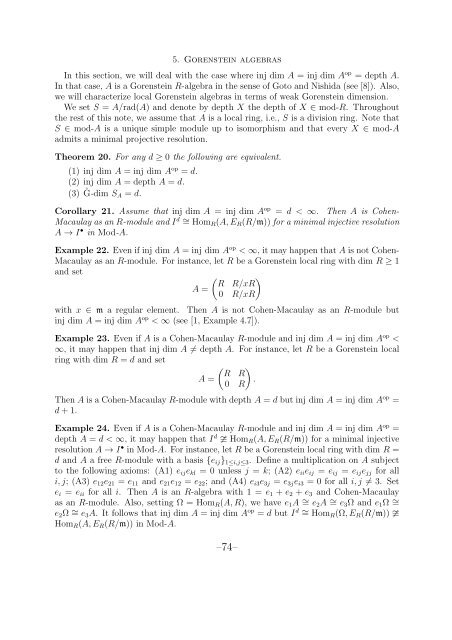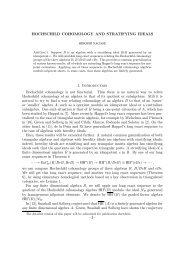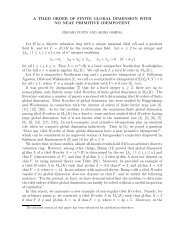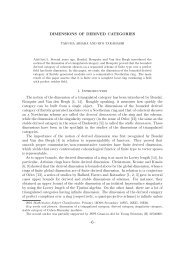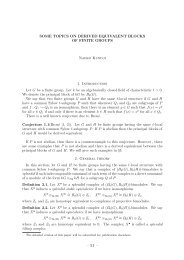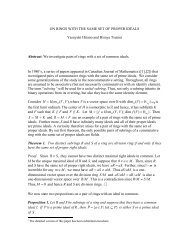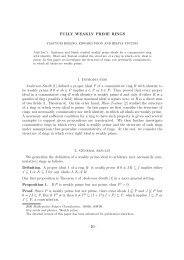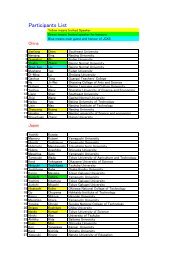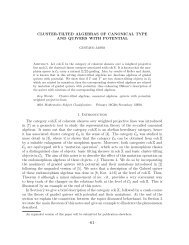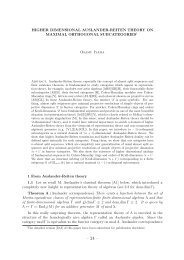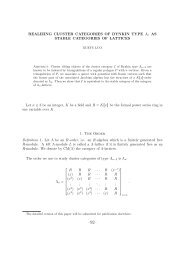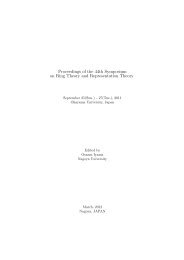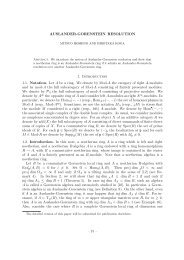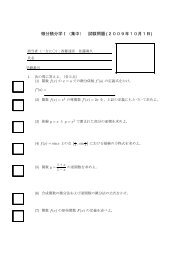Proceedings of the 44th Symposium on Ring Theory and ...
Proceedings of the 44th Symposium on Ring Theory and ...
Proceedings of the 44th Symposium on Ring Theory and ...
You also want an ePaper? Increase the reach of your titles
YUMPU automatically turns print PDFs into web optimized ePapers that Google loves.
5. Gorenstein algebras<br />
In this secti<strong>on</strong>, we will deal with <str<strong>on</strong>g>the</str<strong>on</strong>g> case where inj dim A = inj dim A op = depth A.<br />
In that case, A is a Gorenstein R-algebra in <str<strong>on</strong>g>the</str<strong>on</strong>g> sense <str<strong>on</strong>g>of</str<strong>on</strong>g> Goto <strong>and</strong> Nishida (see [8]). Also,<br />
we will characterize local Gorenstein algebras in terms <str<strong>on</strong>g>of</str<strong>on</strong>g> weak Gorenstein dimensi<strong>on</strong>.<br />
We set S = A/rad(A) <strong>and</strong> denote by depth X <str<strong>on</strong>g>the</str<strong>on</strong>g> depth <str<strong>on</strong>g>of</str<strong>on</strong>g> X ∈ mod-R. Throughout<br />
<str<strong>on</strong>g>the</str<strong>on</strong>g> rest <str<strong>on</strong>g>of</str<strong>on</strong>g> this note, we assume that A is a local ring, i.e., S is a divisi<strong>on</strong> ring. Note that<br />
S ∈ mod-A is a unique simple module up to isomorphism <strong>and</strong> that every X ∈ mod-A<br />
admits a minimal projective resoluti<strong>on</strong>.<br />
Theorem 20. For any d ≥ 0 <str<strong>on</strong>g>the</str<strong>on</strong>g> following are equivalent.<br />
(1) inj dim A = inj dim A op = d.<br />
(2) inj dim A = depth A = d.<br />
(3) Ĝ-dim S A = d.<br />
Corollary 21. Assume that inj dim A = inj dim A op = d < ∞. Then A is Cohen-<br />
Macaulay as an R-module <strong>and</strong> I d ∼ = HomR (A, E R (R/m)) for a minimal injective resoluti<strong>on</strong><br />
A → I • in Mod-A.<br />
Example 22. Even if inj dim A = inj dim A op < ∞, it may happen that A is not Cohen-<br />
Macaulay as an R-module. For instance, let R be a Gorenstein local ring with dim R ≥ 1<br />
<strong>and</strong> set<br />
( )<br />
R R/xR<br />
A =<br />
0 R/xR<br />
with x ∈ m a regular element. Then A is not Cohen-Macaulay as an R-module but<br />
inj dim A = inj dim A op < ∞ (see [1, Example 4.7]).<br />
Example 23. Even if A is a Cohen-Macaulay R-module <strong>and</strong> inj dim A = inj dim A op <<br />
∞, it may happen that inj dim A ≠ depth A. For instance, let R be a Gorenstein local<br />
ring with dim R = d <strong>and</strong> set<br />
( )<br />
R R<br />
A = .<br />
0 R<br />
Then A is a Cohen-Macaulay R-module with depth A = d but inj dim A = inj dim A op =<br />
d + 1.<br />
Example 24. Even if A is a Cohen-Macaulay R-module <strong>and</strong> inj dim A = inj dim A op =<br />
depth A = d < ∞, it may happen that I d ≇ Hom R (A, E R (R/m)) for a minimal injective<br />
resoluti<strong>on</strong> A → I • in Mod-A. For instance, let R be a Gorenstein local ring with dim R =<br />
d <strong>and</strong> A a free R-module with a basis {e ij } 1≤i,j≤3 . Define a multiplicati<strong>on</strong> <strong>on</strong> A subject<br />
to <str<strong>on</strong>g>the</str<strong>on</strong>g> following axioms: (A1) e ij e kl = 0 unless j = k; (A2) e ii e ij = e ij = e ij e jj for all<br />
i, j; (A3) e 12 e 21 = e 11 <strong>and</strong> e 21 e 12 = e 22 ; <strong>and</strong> (A4) e i3 e 3j = e 3j e i3 = 0 for all i, j ≠ 3. Set<br />
e i = e ii for all i. Then A is an R-algebra with 1 = e 1 + e 2 + e 3 <strong>and</strong> Cohen-Macaulay<br />
as an R-module. Also, setting Ω = Hom R (A, R), we have e 1 A ∼ = e 2 A ∼ = e 3 Ω <strong>and</strong> e 1 Ω ∼ =<br />
e 2 Ω ∼ = e 3 A. It follows that inj dim A = inj dim A op = d but I d ∼ = HomR (Ω, E R (R/m)) ≇<br />
Hom R (A, E R (R/m)) in Mod-A.<br />
–74–


